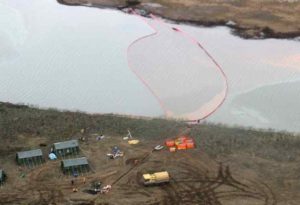Reports indicate melting permafrost caused by global heating may have damaged the industrial facility.

Russian President Vladimir Putin declared a federal emergency Wednesday to help clean up an estimated 20,000 tonnes of diesel fuel that poured into Ambarnaya River Friday after an accident at a power station near Norilsk, an industrial city in the eastern Siberian region of Krasnoyarsk.
After Russian Emergencies Minister Yevgeny Zinichev called for an emergency declaration at a Wednesday meeting about the spill in the Arctic Circle, Putin said, “I agree with your proposal to declare an emergency,” according to the state-owned news agency TASS.
“Russian mining conglomerate Norilsk Nickel, which owns the facility, said [a diesel fuel] tank was damaged when supporting pillars that had ‘held it in place for 30 years without difficulty’ began to sink,” Agence France-Presse reported. “Norilsk is constructed on permafrost and its infrastructure is threatened by melting ice caused by climate change.”
State of emergency in Norilsk after 20,000 tons of diesel leaks into Arctic river system. Fear that thawing permafrost caused damage to storage tank https://t.co/EYvzar8jUQ pic.twitter.com/oN4pOtLZy0
— The Siberian Times (@siberian_times) June 2, 2020
As the Guardian reported Wednesday:
Russia’s investigative committee, which deals with major crimes, announced it had launched three criminal investigations into the accident and detained a power plant employee.
Alexei Knizhnikov of the World Wildlife Fund said the environmental group was the one who alerted cleanup specialists after confirming the accident through its sources. “These are huge volumes,” he said. “It was difficult for them to cover it up.”
The volume of the spill is vastly larger than the 2007 Kerch spill, which involved 5,000 tonne of oil, Knizhnikov said.
Putin’s declaration came after Knizhnikov warned Monday that “diesel fuel is more toxic than crude oil and the situation has such a scale at present that the efficient cleanup cannot be expected without a strong group of resources and equipment of the federal level.”
20,000 tonnes of diesel fuel spilled into a river inside the #Arctic Circle.#Russian president orders state of emergency to call in more resources for cleanup.
The spill happened when a fuel reservoir at a power plant near #Norilsk collapsed on Fridayhttps://t.co/yP38cAJ3S3 pic.twitter.com/2DUF0DeGar
— Osama Bin Javaid (@osamabinjavaid) June 3, 2020
According to Dmitry Klokov, a spokesperson for the Rosrybolovstvo state fishing agency, “It can already be said now that it will take decades for the restoration of the ecological balance of the affected Norilo-Pyasinsky water system.”
The crisis led Scottish ecologist and nature photographer Alan Watson Featherstone to call for restrictions on industrial activities in the area. He declared in a tweet Wednesday: “The Arctic can’t cope with disasters like these.”
According to Dmitry Klokov, a spokesperson for the Rosrybolovstvo state fishing agency, “It can already be said now that it will take decades for the restoration of the ecological balance of the affected Norilo-Pyasinsky water system.” The crisis led Scottish ecologist and nature photographer Alan Watson Featherstone to call for restrictions on industrial activities in the area. He declared in a tweet Wednesday: “The Arctic can’t cope with disasters like these.”
The power plant where the spill occurred, the Guardian noted, “is operated by a division of Nornickel, whose factories in the area have made the [Norilsk] one of the most heavily polluted places on Earth.”
British ecologist and writer Alex Morss also acknowledged those conditions in a tweet about the disaster Wednesday.
“The plant was already the most polluted place in Russia—appalling history,” she wrote. “I hope Russia finds all the help it will need to clean up this catastrophe but some might say it was an avoidable disaster waiting to happen.”
Common Dream’s work is licensed under a Creative Commons Attribution-Share Alike 3.0 License. Feel free to republish and share widely.
